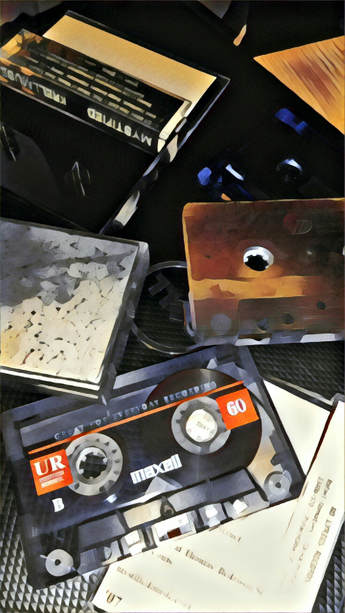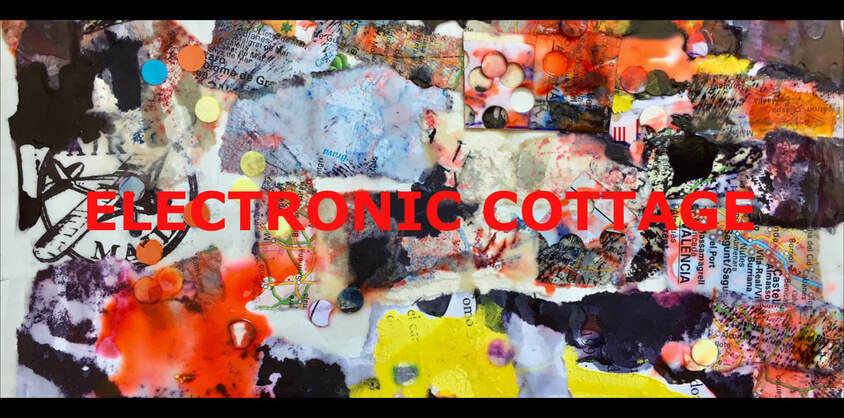 I was working with a pretty popular ambient label, and the proprietor had some words for me. He wanted to sell CDs, and I had been releasing too much material, and a lot of it was free. He pointed out that, in his opinion, what makes a release marketable is that it is special. It has to have a unique quality. If an artist releases too much material, that seems to suggest that a particular release may not be unique. That is an issue I struggled with for most of my career as an indie electronica artist-- the tension between the sheer joys of creating and sharing offbeat material, and the seemingly necessary restraints of making certain things “special”, and therefore profitable. Recently, thanks to Hal McGee’s “Electronic Cottage” site, I am becoming more acquainted with the DIY and hometaper scene that began in the ‘80s and’90s. My first impression is that I am sad that I missed it. My head was in other places during these years. Seeing all the cool stuff that survives is really neat. I got started, as mystified, in the earlier days of netlabels. The availability of the internet and online music sites had an effect on cassette culture. Releasing online was so easy-- low- to mid- fi mp3s and a cover of some kind were created, these were uploaded, and instantly the release could be shared by many. For hometapers, there was this craft of dubbing their material onto actual cassettes-- and in creating actual, material cover art, too. Hence the reliance on dubbing machines (or, I would assume, many, MANY hours going from tape to tape) and copying machines. Hence the many trips to the copy center, and to the post office. Interesting, too, is the notion of generations. For online releases, a lot of times you have your source track, maybe a WAV or AIFF file, and then you have the MP3. In the past, it was the MP3 that went up-- lately, we’re seeing a lot of lossless files being used, instead, with faster internet speeds. With cassette culture, it’s interesting to ponder, when we listen, how close or far we are to the source material of the audio. It’s often very uncertain, and adds a level of mystery. From my standpoint, having hundreds of releases, to have had to actually dub each release-- to have had to xerox, trim, and paste each cassette-- the task would have been daunting. Gone, on the other hand, may be some of the joys of craftmanship-- too, the pleasure that a person might feel when receiving a cool package with a tape or two in it from God knows where. So, DIYers, Hometapers-- this is a bit of a salute. Congratulations for being a part of a culture that tried to make something special. I believe that, in life, we get what we give, and a these people gave a lot to their art-- a lot of time, and a lot of effort. Doing things yourself is a good way to make art special-- it’s the hard work that makes it so-- breaking the chain of uniqueness and forced marketability. I would not want to have to do things the way these folks did. I am glad I can create a release quickly and effectively, and disseminate it, when I have a salient idea. But I can certainly appreciate the efforts of those who came before. Maybe that’s why my musical mentors were either involved with this earlier scene-- or look back on it with great nostalgia.
5 Comments
5/4/2018 19:09:03
Great to hear you thoughts on this, Thomas! I've had some contact/involvement with both the cassette scene and the netlabel scene and find the similarities and differences fascinating to contemplate. One of the article series I plan to write for my page here at EC is, in fact, an exploration of the netlabel scene. I'll pick your brains when and if I ever get around to it.
Reply
Frank
5/4/2018 20:15:45
That is a nice salute to the home tapers, Thomas! You said it better than I could.(I thought I was the only one here, who didn't make tapes... future plans though)
Reply
5/4/2018 20:23:11
Glad you enjoyed, and so glad you considered posting your works.
Reply
5/5/2018 07:41:16
..and again I find a *nice* example that the music industry interferes with creativiy and workflow of artists. Since I'm producing radioshows I heard of many examples of a music industry *killing* music.
Reply
Leave a Reply. |
Thomas Parkis a prolific electronic artist, Archives
March 2019
Categories |


 RSS Feed
RSS Feed